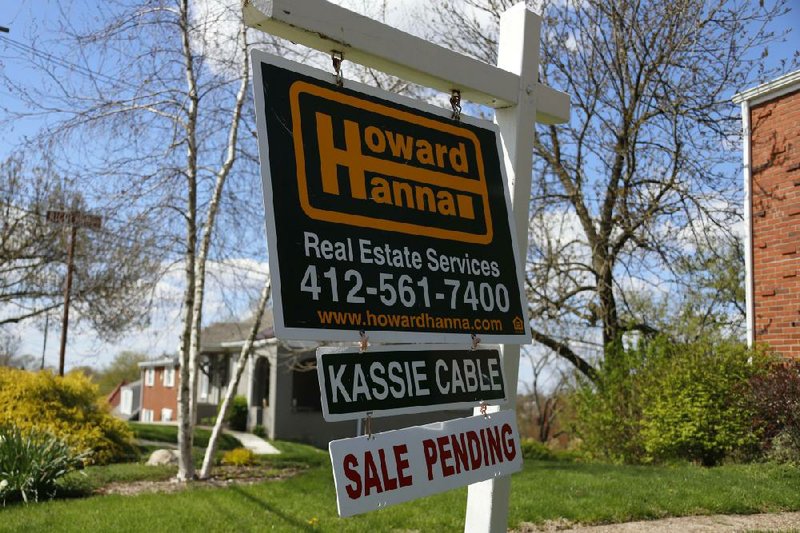With remarkable regularity, each new month seems to send the 30-year fixed-rate mortgage down to a historic low.
According to the latest data released Thursday by Freddie Mac, the 30-year fixed-rate average tumbled to a record-low 3.07% with an average 0.8 point. (Points are fees paid to a lender equal to 1% of the loan amount and are in addition to the interest rate.) It was 3.13% a week ago and 3.75% a year ago.
The 30-year fixed rate is at its lowest level since Freddie Mac began tracking mortgage rates in 1971. This is the fifth time the rate has fallen to a new low in the past several months.
Freddie Mac, the federally chartered mortgage investor, aggregates rates from 125 lenders across the country to determine national average mortgage rates. It uses rates for borrowers with flawless credit scores -- rates that are not available to every borrower.
[CORONAVIRUS: Click here for our complete coverage » arkansasonline.com/coronavirus]
The 15-year fixed-rate average slipped to 2.56% with an average 0.8 point. It was 2.59% a week ago and 3.18% a year ago.
The five-year adjustable-rate average fell to 3% with an average 0.3 point. It was 3.08% a week ago and 3.45% a year ago.
"Mortgage rates fell back to all-time lows this week as the market continues to weigh the economic risks posed by recent surges in covid-19 case counts," said Matthew Speakman, a Zillow economist. "The steady declines suggest that investors are keeping a very close eye on coronavirus case counts and keenly awaiting evidence of how the economy responds as a result of the outbreak."
The historically low interest rates come as the U.S. housing market appears to be rebounding somewhat from the coronavirus-induced spring freeze. Sales of new homes rose a surprisingly strong 16.6% in May as major parts of the country reopened, though sales of existing homes struggled through the month with a 9.7% decline.
A report on pending home sales last week offered some optimism, with the number of Americans signing contracts to purchase homes jumping 44.3% in May after a record-breaking April decline. Those contract signings are a barometer of finalized purchases over the next two months.
The effects of the pandemic sidelined both buyers and sellers in March and April, so there remains a tight supply of homes available for sale, running up against high demand.
"We expect rates will continue to stabilize at current levels between 3% and 3.125% for the near future, but [the 30-year fixed rate] has the potential to gradually decline to 2.75% over the next six months," said Preetam Purohit, head of hedging and analytics at Embrace Home Loans in Middletown, R.I.
Bankrate.com, which puts out a weekly mortgage rate trend index, found half of the experts it surveyed expect rates will be about the same in the coming week.
"This continues to be [an] unusual time in history with the country opening and then closing again, making for uncertainty in every sector," said Mitch Ohlbaum, president of Macoy Capital Partners in Los Angeles. "That said, do not expect any change to rates in the next week ... . There is little or no incentive for the [lenders] to lower rates only to cannibalize their own portfolios with higher yields when they are already struggling under record-breaking refinances."
Mortgage applications retreated last week. According to the latest data from the Mortgage Bankers Association, the market composite index -- a measure of total loan application volume -- decreased 1.8% from a week earlier.
The purchase index fell for the second week in a row. It was down 1% from the previous week and was 15% higher year-over-year. The refinance index slipped 2% and was 74% higher than a year ago. The refinance share of mortgage activity accounted for 61.2% of applications.
"Purchase mortgage applications outpaced year-ago levels for the sixth consecutive week, but activity in recent weeks has cooled," said Bob Broeksmit, association president and chief executive.
"Prospective buyers are seeing limited new and existing housing inventory options to choose from, and consumer confidence is likely being affected by the economic uncertainty caused by the resurgence of covid-19 cases in parts of the South and West," he said. "Homeowners continue to refinance their mortgage at levels far higher than those seen last summer."
Information for this article was contributed by Kathy Orton of The Washington Post and by staff members of The Associated Press.
